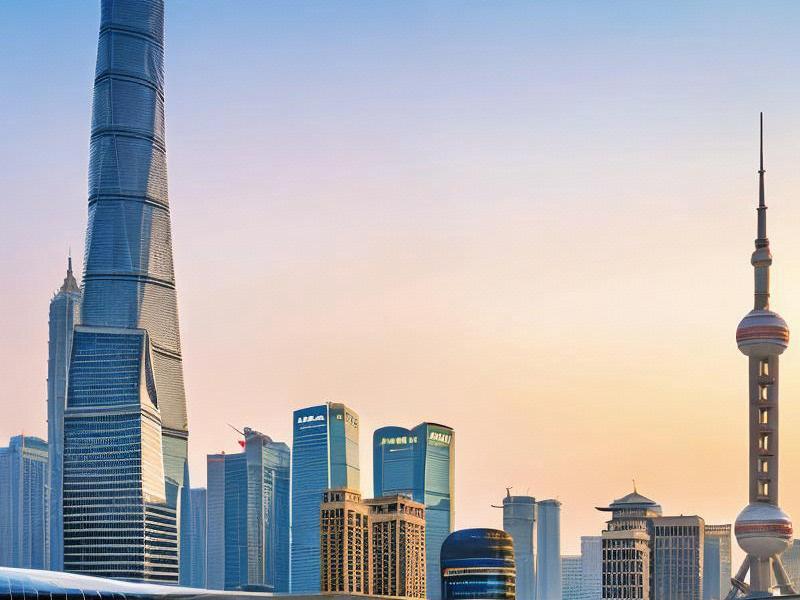Shanghai, known as the "Pearl of the Orient," is a vibrant metropolis that stands as a testament to China's rapid modernization. This article delves into the multifaceted aspects of Shanghai, exploring its economic prowess, cultural vibrancy, and global significance.

Nestled along the banks of the Huangpu River, Shanghai is the largest city in China and one of the world's most dynamic urban centers. With a population exceeding 24 million, it is a melting pot of cultures, languages, and traditions. The city's skyline, dominated by iconic structures like the Oriental Pearl Tower and the Shanghai Tower, is a symbol of its economic and technological advancements.
Economic Powerhouse
Shanghai has long been recognized as China's economic powerhouse. Since the late 19th century, when it was opened up to foreign trade, the city has been at the forefront of China's economic reforms. Today, it is home to the Shanghai Stock Exchange, one of the largest in the world, and a hub for international finance.
The city's Pudong district, once a rural area, has transformed into a global financial district, housing the headquarters of numerous multinational corporations. The Lujiazui Financial District, with its modern skyscrapers, is a testament to Shanghai's status as a leading financial center.
Shanghai's port, the Port of Shanghai, is the busiest container port in the world, handling billions of tons of cargo annually. This maritime gateway underscores the city's importance in global trade and logistics.
Cultural Fusion
Beyond its economic achievements, Shanghai is renowned for its cultural diversity and historical significance. The city is a blend of traditional Chinese culture and Western influences, reflecting its colonial past and cosmopolitan present.
The Bund, a historic waterfront promenade, showcases a stunning array of colonial-era buildings that stand in contrast to the modern skyscrapers of Pudong across the river. This juxtaposition symbolizes the city's ability to preserve its history while embracing the future.
爱上海最新论坛
Shanghai's art scene is thriving, with galleries, theaters, and cultural institutions showcasing both traditional and contemporary works. The city is also famous for its vibrant nightlife, with districts like Nanjing Road and Huaihai Road offering a mix of shopping, dining, and entertainment.
Global Influence
Shanghai's influence extends far beyond China's borders. It is a key player in international diplomacy, hosting major global events such as the G20 Summit and the World Expo. The city's international airport, Shanghai Pudong International Airport, serves as a gateway for millions of travelers each year, connecting China to the rest of the world.
Shanghai is also a leader in innovation and technology. The city's Zhangjiang Hi-Tech Park is home to numerous high-tech companies and research institutions, driving advancements in fields such as biotechnology, information technology, and clean energy.
Urban Development
Shanghai's urban planning and infrastructure are models of modern efficiency. The city has invested heavily in public transportation, with its extensive metro system providing convenient and affordable access to all parts of the city. The Maglev train, connecting Pudong International Airport to the city center, is a marvel of modern engineering.
The city's green initiatives aim to balance rapid development with environmental sustainability. Shanghai has implemented various measures to reduce pollution, promote renewable energy, and enhance urban green spaces. The city's waterfront parks and the iconic Yu Garden are examples of its commitment to creating livable urban environments.
上海龙凤sh419
Challenges and Opportunities
Despite its many achievements, Shanghai faces challenges such as population density, housing shortages, and environmental concerns. The city government is actively addressing these issues through innovative policies and sustainable practices.
One of the key challenges is managing the influx of people into the city. Shanghai has implemented measures to control population growth, including stricter residency permits and housing policies. The city is also investing in affordable housing projects to ensure that residents have access to quality living conditions.
Environmental sustainability is another critical area of focus. Shanghai is working to reduce air pollution, improve waste management, and promote green transportation. The city's efforts to combat climate change include initiatives to increase energy efficiency and reduce carbon emissions.
Education and Innovation
Shanghai is a leader in education and innovation, with world-class universities and research institutions. Fudan University and Tongji University are among the top institutions in China, attracting students and researchers from around the world.
The city's innovation ecosystem is thriving, with incubators, accelerators, and venture capital firms supporting startups and entrepreneurs. Shanghai's entrepreneurial spirit is evident in its vibrant tech scene, with companies like ByteDance and iQIYI making significant contributions to the global technology landscape.
上海娱乐联盟
Tourism and Hospitality
Shanghai's rich history and cultural heritage make it a popular destination for tourists. The city offers a wide range of attractions, from historical landmarks like the Yu Garden and the Former French Concession to modern attractions like the Shanghai Tower and the Shanghai Museum.
The hospitality industry in Shanghai is highly developed, with luxury hotels, boutique accommodations, and diverse dining options catering to visitors from all over the world. The city's tourism board works to promote sustainable tourism practices, ensuring that the influx of visitors does not compromise the quality of life for residents.
Conclusion
Shanghai is a city of contrasts and coexistence, where ancient traditions meet modern innovations. Its economic prowess, cultural vibrancy, and global influence make it a unique and dynamic metropolis. As Shanghai continues to grow and evolve, it remains a beacon of progress and a symbol of China's aspirations on the world stage.
The city's ability to balance rapid development with sustainability, manage challenges effectively, and embrace opportunities for growth is a testament to its resilience and adaptability. Shanghai's story is one of transformation, a narrative that reflects the broader journey of China as it navigates the complexities of modernization and globalization.
In the years to come, Shanghai will undoubtedly continue to shape the future of China and the world. Its innovative spirit, cultural richness, and commitment to sustainability will ensure that it remains a leading global city, inspiring and influencing generations to come.